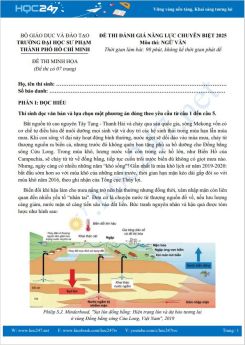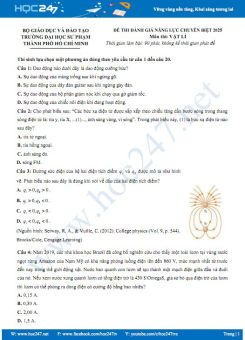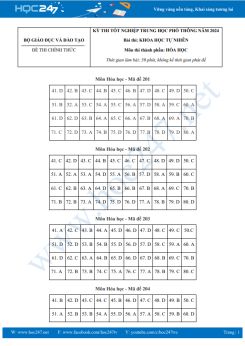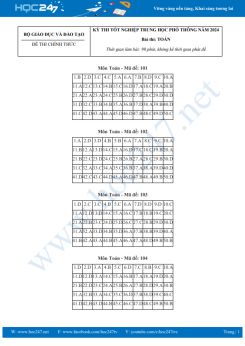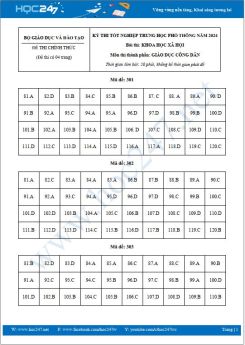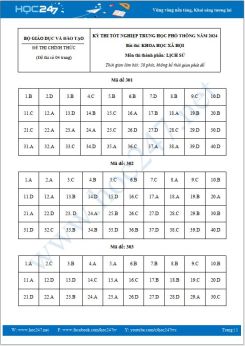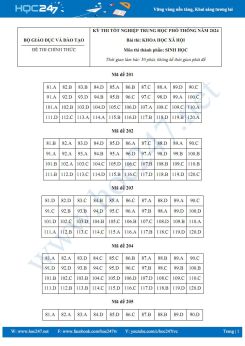DŲ░ß╗øi ─æ├óy l├Ā "─Éß╗ü thi minh hß╗Źa ─É├Īnh gi├Ī n─āng lß╗▒c (─ÉGNL) n─ām 2025 m├┤n tiß║┐ng Anh" cß╗¦a TrŲ░ß╗Øng ─Éß║Īi hß╗Źc SŲ░ phß║Īm Th├Ānh phß╗æ Hß╗ō Ch├Ł Minh. Vß╗øi m├┤n tiß║┐ng Anh, cß║źu tr├║c ─æß╗ü thi vß║½n giß╗» nguy├¬n nhŲ░ c├Īc n─ām vß╗½a qua, hŲ░ß╗øng ti├¬╠üp c├ó╠Żn theo ─æi╠Żnh da╠Żng ba╠Ći thi ─æa╠ünh gia╠ü n─āng lŲ░╠Żc tŲ░╠Ć b├ó╠Żc 3 ─æ├¬╠ün b├ó╠Żc 5 theo Khung n─āng lß╗▒c ngoß║Īi ngß╗» 6 bß║Łc d├╣ng cho Viß╗ćt Nam. Ngß╗» liß╗ću trong ─æß╗ü thi ─æa dß║Īng, ─æŲ░ß╗Żc lß║źy trong nhiß╗üu l─®nh vß╗▒c kh├Īc nhau. Hi vß╗Źng ─æß╗ü thi tr├¬n sß║Į l├Ā mß╗Öt t├Āi liß╗ću quan trß╗Źng ─æß╗ā gi├║p c├Īc em cß╗¦ng cß╗æ kiß║┐n thß╗®c v├Ā c├│ th├¬m kinh nghiß╗ćm trong viß╗ćc trß║Żi nghiß╗ćm ─æß╗ü thi ─æ├Īnh gi├Ī n─āng lß╗▒c theo cß║źu tr├║c mß╗øi. Ch├║c c├Īc em hß╗Źc tß╗æt!
|
Bß╗ś GI├üO Dß╗żC V├Ć ─É├ĆO Tß║ĀO TRŲ»ß╗£NG ─Éß║ĀI Hß╗īC SŲ» PHß║ĀM TH├ĆNH PHß╗É Hß╗Æ CH├Ź MINH |
─Éß╗Ć THI ─É├üNH GI├ü N─éNG Lß╗░C CHUY├ŖN BIß╗åT 2025 B├ĆI THI: ANH V─éN Thß╗Øi gian l├Ām b├Āi: 180 Ph├║t (Kh├┤ng kß╗ā thß╗Øi gian ph├Īt ─æß╗ü) |
─Éß╗Ć THI
LISTENING (40 MINS)
Directions:
In this section of the test, you will have an opportunity to demonstrate your ability to understand conversations and talks in English. There are three parts in this section with special directions for each part. Answer all the questions on the basis of what is stated or implied by the speakers in the recording. The recording will be played ONCE only.
Part 1: Questions 1-8
Directions:
In this part, you will hear EIGHT short announcements, instructions or dialogues. There is one question for each announcement or dialogue. For each question, click on the right answer. You will hear the recording ONCE only. Now, let's listen to an example. On the recording, you will hear:
Man: Hello. This is the travel agency returning your call. You left a message about the holiday you've booked, asking which meals are included in the cost during your stay at Sunny Hotel. Lunch and dinner are free but if you wish to have breakfast in the hotel, you will need to pay an extra amount of money, depending on what you order. Let me know if I can help you with any other information. Goodbye.
On the test book, you will read:
Which meal is NOT included in the price of the holiday?
A. Breakfast
B. Lunch
C. Dinner
D. All
The correct answer is A. Breakfast. Now, let's begin with the first question.
Part 1: Questions 1-8
1. What is the purpose of this announcement?
A. To ask people to leave.
B. To promote a special offer.
C. To announce the time.
D. To invite people to return.
2. What should passengers do before landing?
A. Get out their ticket.
B. Change their seats.
C. Pack their bags.
D. Put their luggage under the seat.
3. What should the receptionist do first?
A. Say hello.
B. Ask his name.
C. Have him sign the book.
D. Call the person he is visiting.
4. What is the talk about?
A. An exam on Friday.
B. The students' poor grades.
C. The writing assignments.
D. Last year's projects.
5. What are passengers requested to do?
A. Buy tickets for another service.
B. Wait where they are.
C. Move to another location.
D. Get on a different bus.
6. What are the speakers discussing?
A. A vacation package.
B. A work schedule.
C. A job opportunity.
D. A business course.
7. How long does the lecture last?
A. About 2 hours.
B. About 3 hours.
C. About 4 hours.
D. About 5 hours.
8. Who most likely are the speakers?
A. Job applicants.
B. Office workers.
C. Website developers.
D. Photographers.
Part 2: Questions 9-20
Directions:
In this part, you will hear THREE conversations. The conversations will not be repeated. There are four questions for each conversation. For each conversation, click on the correct answer. You will hear the recording ONCE only.
Listen to a conversation between a teacher and a student.
Questions 9-12
9. What are the speakers mainly talking about?
A. A cooking class at an institute.
B. A school extra-curricular activity.
C. The menu for someone's party.
D. An assignment in an economics class.
11. What does the teacher say about the cooking program?
A. Mrs. Logan will teach the cooking class.
B. Students will make 2 kinds of food.
C. Students will study with another teacher.
D. It takes place every Friday.
10. How long does the cooking class last?
A. One month.
B. Two months.
C. Three months.
D. Four months.
12. What will the student probably do next?
A. Ask more friends to join the cooking class.
B. Go home and practice making sandwiches.
C. Get his mother's permission to take the class.
D. Start taking cooking lessons immediately.
Questions 13-16
Listen to a conversation between a man and a woman.
13. What is the conversation mainly about?
A. Culture in Korea.
B. Problems of visitors to Korea.
C. What people think of Korean.
D. Eating customs in Korea.
14. What is the woman planning to do?
A. Teaching English to a Korean student.
B. Visiting a Korean friend.
C. Working in Korea.
D. Applying to study in Korea.
15. What does the man say about age in Korean culture?
A. Older people have higher social positions.
B. Young people should show respect to older people.
C. Old people need support from young people.
D. Young people cannot eat with older people.
16. What does the man mean when he says, "You could say that"?
A. He agrees with what the woman has said.
B. He thinks the woman is wrong.
C. He does not understand what the woman has said.
D. He encourages the woman to express her idea.
Questions 17-20
Listen to a conversation between a man and a woman.
17. What is the topic of the conversation?
A. Science fiction stories about aliens.
B. How aliens might communicate with Earth.
C. How scientists search the universe for alien life.
D. Possible characteristics of alien life forms.
18. What does the man mean when he says, "Well, none has ever been found, has it?"
A. He is unsure whether life on other planets exists.
B. He doesn't believe that life exists on other planets.
C. He doesn't think scientists are looking for extraterrestriallife.
D. He thinks that extraterrestrial life will be found soon.
19. Why is liquid water necessary?
A. All life on Earth is based on water.
B. It only exists on planets with mild climates.
C. It helps to form complex carbon molecules.
D. It is involved in many biological processes.
20. What does the man imply when he says, "OK, but you have to admit it would be a lot more of a thrill to find intelligent life"?
A. Intelligent life is much more interesting.
B. Scientists are only interested in intelligent life.
C. Intelligent life is much less likely to be found.
D. It is much easier to find intelligent life.
Part 3: Questions 21-35
Directions:
In this part, you will hear THREE lectures. The lecture will not be repeated. There are five questions for the lecture. For each question, click on the correct answer. You will hear the recording ONCE only.
Questions 21-25
Listen to a lecture and answer the questions.
21. The professor asks his students to take notes on ________.
A. learning a computer language.
B. composition written projects.
C. courses to take to graduate.
D. general education courses.
22. What is a must to satisfy the English requirement?
A. 6 basic writing classes.
B. 6 credits in written project.
C. 2 writing papers or more.
D. 1 foreign language.
23. How many hours of mathematics courses do students need?
A. Two.
B. Three.
C. Six.
D. Twelve.
24. How does the professor explain graduation requirements?
A. By summarizing them in one sentence.
B. By listing requirements for graduation.
C. By telling a story about his undergraduate studies.
D. By letting the students guess.
25. Which of the following is NOT a requirement?
A. Math.
B. History.
C. Literature.
D. Physical education.
Questions 26-30
Listen to a lecture and answer the questions.
26. What is this passage mainly about?
A. Finding a marriage partner.
B. Chinese marriage traditions.
C. Hopi marriage customs.
D. Having babies.
27. Which of the following is TRUE about marriage in China?
A. Arranged marriages are no longer in existence nowadays.
B. Matchmakers helped parents find a suitable spouse for their children.
C. Most young people are dependent on matchmakers.
D. In the past, marriage was decided by the matchmaker.
28. According to the professor, what is an "arranged marriage"?
A. One that is decided by senior family members.
B. One that parents of marriage partners had promised before.
C. One that is arranged by the matchmaker.
D. One that marriage partners arrange their own wedding.
29. What is the speaker's opinion about choosing a marriage partner?
A. It has a similar pattern around the world.
B. It is a challenging task for most people.
C. It is related to how old the partners are.
D. It requires how many times the partners meet.
30. How does the professor present his ideas?
A. By presenting opinions.
B. By telling a story.
C. By comparing and contrasting traditions.
D. By arguing one view over another.
Questions 31-35
Listen to a lecture and answer the questions.
31. According to the lecture, what is TRUE about Bluetooth?
A. It was the earliest and most popular electronic device.
B. It was used to connect different electronic devices with cables.
C. It was developed to solve the problem of cables.
D. It can replace keyboards, mouses, and printers.
32. Why does the teacher mention "wireless mouse products"?
A. To give an example of how Bluetooth is used.
B. To explain how Bluetooth chips are placed in devices.
C. To emphasize why Bluetooth chips must be developed.
D. To advertise for a newtechnology.
33. Why does the teacher say, "Perhaps the chip is blue and shaped like a tooth"?
A. To introduce the person who created Bluetooth.
B. To have students think about the origin of the name.
C. To point out how the name can be confusing.
D. To explain the characteristics ofthe chip features.
34. What does the phrase "put in an order" probably mean?
A. To put in the correct order.
B. To make an arrangement.
C. To make a purchase of food.
D. To divide into classification.
35. What is the teacher's opinion of Bluetooth technology?
A. He believes it can compete with other newtechnologies.
B. He is doubtful it will replace other existing devices.
C. He thinks it will greatly influence our lives.
D. He feels people are expecting too much from it.
---(─Éß╗ā xem tiß║┐p nß╗Öi dung cß╗¦a ─æß╗ü thi c├Īc em vui l├▓ng Xem Online hoß║Ęc ─æ─āng nhß║Łp v├Āo Hß╗īC247 ─æß╗ā tß║Żi vß╗ü m├Īy)---
Tr├¬n ─æ├óy l├Ā mß╗Öt phß║¦n nß╗Öi dung t├Āi liß╗ću ─Éß╗ü minh hoß║Ī ─ÉGNL 2025 m├┤n tiß║┐ng Anh TrŲ░ß╗Øng ─Éß║Īi hß╗Źc SŲ░ phß║Īm TPHCM. ─Éß╗ā xem th├¬m nhiß╗üu t├Āi liß╗ću tham khß║Żo hß╗»u ├Łch kh├Īc c├Īc em chß╗Źn chß╗®c n─āng xem online hoß║Ęc ─æ─āng nhß║Łp v├Āo trang hoc247.net ─æß╗ā tß║Żi t├Āi liß╗ću vß╗ü m├Īy t├Łnh.
Mß╗Øi c├Īc em tham khß║Żo c├Īc t├Āi liß╗ću c├│ li├¬n quan:
- ─Éß╗ü thi minh hß╗Źa ─ÉGNL 2025 m├┤n Vß║Łt l├Ł TrŲ░ß╗Øng ─Éß║Īi hß╗Źc SŲ░ phß║Īm HCM
- ─Éß╗ü minh hoß║Ī ─ÉGNL 2025 m├┤n Ngß╗» v─ān TrŲ░ß╗Øng ─Éß║Īi hß╗Źc SŲ░ phß║Īm TP.HCM
Hy vß╗Źng t├Āi liß╗ću n├Āy sß║Į gi├║p c├Īc em hß╗Źc sinh ├┤n tß║Łp tß╗æt v├Ā ─æß║Īt th├Ānh t├Łch cao trong hß╗Źc tß║Łp.
T├Āi liß╗ću li├¬n quan
TŲ░ liß╗ću nß╗Ģi bß║Łt tuß║¦n
- Xem thêm






